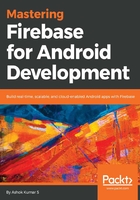
Conventions used
There are a number of text conventions used throughout this book.
CodeInText: Indicates code words in text, database table names, folder names, filenames, file extensions, pathnames, dummy URLs, user input, and Twitter handles. Here is an example: "Mount the downloaded WebStorm-10*.dmg disk image file as another disk in your system."
A block of code is set as follows:
FirebaseUser user = FirebaseAuth.getInstance().getCurrentUser();
if (user != null) {
// When User is signed in
} else {
// When user is not signed in
}
When we wish to draw your attention to a particular part of a code block, the relevant lines or items are set in bold:
myTrace = FirebasePerformance.getInstance().newTrace("packt_trace")
myTrace?.start()
val bundle = Bundle()
bundle.putString("oncreate", "created")
mFirebaseAnalytics?.logEvent(FirebaseAnalytics.Event.SELECT_CONTENT, bundle)
myTrace?.stop()
Any command-line input or output is written as follows:
npm install -g firebase-tools
Bold: Indicates a new term, an important word, or words that you see onscreen. For example, words in menus or dialog boxes appear in the text like this. Here is an example: "Select System info from the Administration panel."
Warnings or important notes appear like this.
Tips and tricks appear like this.